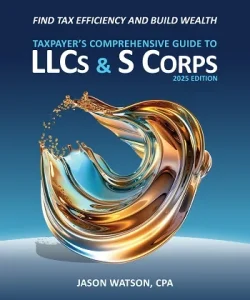
Business Advisory Services
Everything you need to help you launch your new business entity from business entity selection to multiple-entity business structures.
Hey - Our site just had a makeover and we are sorting through the hiccups!
Hey - Our site just had a makeover and we are sorting through the hiccups!

Everything you need to help you launch your new business entity from business entity selection to multiple-entity business structures.

Designed for rental property owners where WCG CPAs & Advisors supports you as your real estate CPA.

Everything you need from tax return preparation for your small business to your rental to your corporation is here.

Posted Friday, August 8, 2025
Table Of Contents
 Ahhhh… what a cute picture. These are not business owners or two accidental sole proprietorship operators. They might be business sellers though. Sarcastically, business ownership does not mean you own a business; it means thebusiness owns you, but that can be a good thing!
Ahhhh… what a cute picture. These are not business owners or two accidental sole proprietorship operators. They might be business sellers though. Sarcastically, business ownership does not mean you own a business; it means thebusiness owns you, but that can be a good thing!
Pursuing a passion and making it into a profitable enterprise is a great way of life, but certain foundational steps need to be in place for long-term success. Liability protection, self-employment taxes, tax planning and estimated tax payments, retirement savings and solo 401k plans, accountable plan reimbursements, exit strategies, business valuations, etc. are all considerations that many small business owners neglect. LLC? A good old fashioned C Corp? S Corp Formation? Keep it a sole proprietorship? Perhaps a Limited Partnership? We can help.
Business entity selection is important, but it is not cast in stone. Many businesses often start off as one entity type, and then later convert. WCG CPAs & Advisors did just that; we were an LLC until the founding partners expanded ownership to include other partners and employees. At that point it was better to convert to a corporation so that shares may be sold or paid out, versus member interest in an LLC.
First, we’ll talk about some basic business entity concepts.
Some sole proprietorships are concerned about being sued and therefore they create a limited liability company… an LLC… to protect their assets. Good or bad? It depends of course.
Can I be sued if I form an LLC for my business activities? Yes. What about a corporation? Yes!
Not only could you be sued on a personal level, you can also lose on a personal level. While consultation with an experienced business law attorney is strongly recommended for your unique situation, as business owners ourselves, we feel the excitement of the LLC, especially the words “limited liability,” has overshadowed the reality of our litigious society. Keep in mind that a closely held business is simply a collection of people who are ultimately and personally responsible for the actions of the business.
In other words, if your careless acts, errors or omissions injure someone even though it was under the auspice of your LLC, good chances you will be personally named in the lawsuit in addition to the business, and held liable as the owner of the LLC. Remember that injury is not limited to just bodily injury; it could also mean financial injury.
 Being Sued With A Corporation
Being Sued With A CorporationOfficers and directors of corporations are routinely held liable for the actions of the corporation. This is called piercing the corporate veil. Can you say Enron? As alluded to earlier, piercing the corporate veil typically is most effective with smaller privately held business entities (close corporations) in which a) the corporation has a small number of shareholders, b) has limited assets, and c) separating the corporation from its shareholders would promote fraud or an inequitable result. Sounds like about 99% of the corporations out there, right? Right! LLCs are similar.
Let’s also bring up a Trust. A lot of people set up a trust and in most cases, a revocable or living trust, where you are both grantor and trustee. This type of trust is worthless until you pass away- sure, your assets are titled in the trust and blah blah blah, but it does nothing for asset protection. A revocable trust has two primary purposes once you pass away- to avoid probate which is public record, and to “speak from the grave” in terms of how your estate is administered.
However, while you are alive, a revocable trust or living trust or family trust or the amazing Buckingham family trust dated July 4, 2025 or whatever tricked out name you want, does nothing. Absolutely nothing. Until you die- then your trust springs into action. Until then, your house that is “owned” by your trust is truly controlled by you and is inextricably connected to you, and be used to pay creditors and judgments.
The only way to shield your assets including for Medicare purposes is to use an irrevocable trust- but this is like the Hotel California. Your assets check in but never leave. Or is that a roach motel? At any rate, you, the grantor, cannot be the trustee in an irrevocable trust. Therefore, you do not control your assets and they are effectively disconnected from you.
So, what do you do? First, securing a decent umbrella policy, both at the personal and commercial level, is our strong recommendation for liability arising from your acts, errors and omissions. Speak to your insurance agent, but typical umbrella policies are $1,000-$1,500 per year. Second, speak to a qualified business law attorney.
Third, and this is the most important, be a good person. If you are a landlord, fix that railing. If you are a truck driver, be diligent in your driving.
We’ve expanded on this LLC fallacy in our KB articles from our book, Taxpayer’s Comprehensive Guide to LLCs and S Corps.

Just like 401k’s are not IRAs, LLC’s are not corporations. The C stands for company not corporation. LLCs file Articles of Formation or Organization… not Incorporation. You don’t issue shares in an LLC nor do you have shareholders. You have members who own an interest (economic or equity, or both). Sorry to be snooty, but there are some strong technical differences.
Quick Myth Buster- As mentioned above, LLCs do NOT automagically protect you from all lawsuits- limited liability does not mean tort liability. Huge misconception! Do you really think the world would go ’round if your errors and omissions could be wiped clean through an LLC? Nope. Turn the tables for a moment. What if you were on the receiving end of a car accident and the bozo waives some formation documents and says, “You can’t sue me. This is a business car!” We doubt our justice system and our demands for equity would allow that.
You do receive some liability protection. For example, if you sign a contract with an internet provider as a member of the LLC and you are not signing as an individual, then if your business fails your personal assets should be shielded from liability for the internet contract. This is one of the fundamental differences between a sole proprietor and an LLC.
You should always seek the advice of a competent business law attorney.
This entity formations podcast featuring Jason Watson, CPA, and guests Amanda Rowles and Joseph Bassett of WCG CPAs & Advisors explores basic business entity considerations such physical nexus, economic nexus, LLCs versus corporations, and how this impacts professionals such as attorneys, physicians, accountants, engineers, etc. plus adding other members such as a spouse or children. We also touch lightly on the benefits of an S Corp but we also have a full-blown podcast on that topic alone (stay tuned).
Historically C corporations, or just corporation for short, had be created with the guidance of a skillful attorney. Articles of Incorporation needed to be drafted and stock certificates were printed, and the whole thing was a big deal. Today, and thanks to LLCs and the online creation tools offered by most Secretary of States, corporations are just as easy to form as an LLC. Boilerplate Articles of Incorporation and Bylaws are available online, and satisfy most situations out of the gate. However, if you have multiple shareholders beyond you or you and your spouse, then an attorney should be consulted to draft these documents.
Several states require certain professions such as accounting, law, medicine, architecture and engineering to be a Professional Corporation (PC). These have the same housekeeping and corporate governance as a C corporation, and they can also elect S corporation status. Other states only require these professions to create a Professional Limited Liability Company (PLLC). Again, PLLCs can also elect S Corp taxation.
Some states don’t recognize a PLLC. So, as a professional (as that term is defined by your state and not your bartender), you might be required to form a PC. As of this writing, these states do not recognize PLLC as an entity type- Alaska, Alabama, California, Delaware, Georgia, Hawaii, Illinois, Indiana, Kansas, Louisiana, Maryland, Missouri, Nebraska, New Jersey, New Mexico, Ohio, Oregon, Rhode Island, South Carolina, Wisconsin and Wyoming. This does not mean that they don’t let certain professions such as doctors, lawyers, accountants and engineers operate as an LLC, however.
We can help navigate your state’s particular rules including your governing body (like a Medical Board or Bar Association).
Well, only one. In California, a corporate officer can elect out of the state disability insurance (SDI). However, an LLC member cannot (nor can an LLC taxed as a corporation). As such, the underlying entity must be a corporation to elect out.
Here’s the rub- being a corporation requires a separate tax return (Form 1120) in addition to your Form 1040 tax return. This adds tax return preparation costs, and it is not tax efficient.
What do you do? In California, here is our recommendation and series of flowchart decisions to consider-
WCG CPAs & Advisors can walk you through all this. It’s what we do all day, everyday.
 As mentioned elsewhere, an S corporation does not exist as an entity. Some other underlying entity must exist, such as an LLC or corporation, that then chooses to be taxed as an S Corp. People say “I have an S Corp” all the time… and there is nothing wrong with that, but technically you have some other recognized entity being taxed as an S corporation. You won’t see “S Corp” listed on a Secretary of State’s website. You also won’t see sole proprietorship listed on the SOS website either… and therefore you cannot S Corp elect your sole proprietorship. You need a recognized business entity.
As mentioned elsewhere, an S corporation does not exist as an entity. Some other underlying entity must exist, such as an LLC or corporation, that then chooses to be taxed as an S Corp. People say “I have an S Corp” all the time… and there is nothing wrong with that, but technically you have some other recognized entity being taxed as an S corporation. You won’t see “S Corp” listed on a Secretary of State’s website. You also won’t see sole proprietorship listed on the SOS website either… and therefore you cannot S Corp elect your sole proprietorship. You need a recognized business entity.
Reducing your self-employment taxes is the main reason business owners want to be taxed as an S Corp. There are some issues such as payroll, corporate tax return requirements and passive incomes. But if you have over $50,000 in net business income after expenses, you might want to give it some serious consideration. Why? You could save about 8% to 10% of your net business income in taxes… so, if you earn $100,000 in your business after expenses, either as a sole proprietorship or LLC, you could save $8,000 to $10,000 in taxes.
Does an S Corp make sense? Here are some questions to consider-
Are you still here? Excellent news — read on! You can also complete an online secure form of the above questions, and send them to us for review.
Conversely, unless you are guaranteed to make a bunch of money we do not immediately file Form 2553 (S Corp election) to perfect the S Corp formation. Since we can always file a late S Corp election back to the inception of the entity, we commonly do a wait and see. We can also go back to January of the current year if the entity was formed in a prior year. There is no sense lighting all the fires that go along with an S corporation unless you are experiencing net profits. If you lose money your first year or two, an S Corp does nothing except add to your tax preparation bill.
Here are the quick benefits of an S Corp election:
How do you form an S corporation? Technically, how do you create an entity (LLC, PC, etc.) and have it taxed as an S Corp? Let’s talk about it! Latesha Anderson of WCG CPAs & Advisors takes you through forming your business entity including registering with the secretary of state, obtaining an EIN from the IRS, filing Form 2553 (S Corp Election) and other issues surrounding S corporations.
 WCG CPAs & Advisors and Jason Watson, CPA, have released the 2025 Edition of Taxpayer’s Comprehensive Guide to LLCs and S Corps. Over 400 pages of pure pleasure! This edition has updated 2025 data such as IRA and 401k limits including Social Security wage limits, but it also has a bunch of new information spread out various chapters such as customized multi-entity structures, expanded reasonable shareholder salary sections, more tax reduction mechanics among various little tidbits gleaned from hundreds of small business consultations. Riveting!
WCG CPAs & Advisors and Jason Watson, CPA, have released the 2025 Edition of Taxpayer’s Comprehensive Guide to LLCs and S Corps. Over 400 pages of pure pleasure! This edition has updated 2025 data such as IRA and 401k limits including Social Security wage limits, but it also has a bunch of new information spread out various chapters such as customized multi-entity structures, expanded reasonable shareholder salary sections, more tax reduction mechanics among various little tidbits gleaned from hundreds of small business consultations. Riveting!
It is available in paperback for $49.95 from Amazon and as an eBook for Kindle for $39.95. Our book is also available for purchase as a PDF from ClickBank for $29.95. Why do we all love 95 cents? We all know that 39.95 is really 40 bucks. At least we are not like gas stations… $39.949. Silly! Yet we digress. Apple iBook, Barnes and Noble Nook, among others are not utilized since their format is challenging to make mini updates here and there.
How can I avoid self-employment taxes? This simple question was the inspiration for creating an article describing the benefits of an S Corporation. That original article, which was about four pages long, quickly became a series of Knowledge Base articles on the WCG website. The articles touched on basic topics such as how to elect S Corp status, shareholder payroll, reasonable salary determination and liability protection. Those broad topics demanded much more information, both horizontally by spanning into more related issues, and vertically by digging deeper into the granular yet riveting levels of the tax code. Beyond general S Corp benefits, our book will show you-
This book is written with the general taxpayer in mind. Too many resources simply regurgitate complex tax code without explanation. While in some cases tax code and court opinions are duplicated verbatim because of precision of the words, this book strives to explain many technical concepts in layperson terms with some added humor and opinions. We believe you will find this book educational as well as amusing.
Each week we receive several phone calls and emails from small business owners and other CPAs across the country who have read our Taxpayer’s Comprehensive Guide to LLCs and S Corps and praised the wealth of information. Regardless of your current situation, whether you are considering starting your own business or entertaining a contracting gig, or you are an experienced business owner, the contents of this book are for you.
While this book’s origins were based on reducing self-employment taxes through an S Corporation election, it has dramatically expanded to sound business advice from entity structures to operational considerations to business tax deductions and retirement planning.
Enjoy! And please send us all comments, hang-ups and static. This book is as much yours as it is ours, except the tiny royalty part- that’s ours. Stop by and we’ll buy you a beer with the pennies.
While we have you, please check out our rental property book aimed at real estate investors, I Just Got A Rental, What Do I Do?
If you buy our 430-page book and think that we didn’t help you understand small business tax law or the benefits of S corporations, let us know. We never want you to feel like you wasted your money. If you are ready to add some insightful reading into your day, click on one of the preferred formats. Amazon is processed by Amazon, and the PDF is safely processed by ClickBank who will email you the PDF as an attachment.
 |  |  |
| $49.95 | $39.95 | $29.95 |
We just outlined a bunch of different entity types beyond the sole proprietorship. In addition we strongly suggest you read Chapters 1 and 2 from our book, Taxpayer’s Comprehensive Guide to LLCs and S Corps. In the meantime, here is a summary of the benefits (or lack thereof) of the sole proprietorship-
| Employer Identification Number (EIN) | Yes, but under your SSN |
| Bank Account | No, but you can get a separate personal checking account |
| Process Payroll | Yes, provided you have an EIN |
| 401k, SEP IRA | Yes |
| Wholesale Transfer of Ownership | Yes (provided it is an asset sale) |
| Partial Transfer of Ownership | Nearly impossible (ie, cannot add partners) |
| Financial Liability Protection | None |
| S Corp Election | No |
| Tax Rate | 15.3% + ordinary income tax (10% to 37%) |
| Ability to Deduct Expenses | Same as any other LLC, corporation, etc. |
| California Franchise Tax | No (the one benefit of a sole proprietorship) |
| Other States Franchise, Business Tax | Varies |
The California thing is a conundrum. If you just starting out, and have no idea if you will make money, a sole proprietorship might make sense? Why? You still get to deduct all your business expenses and you also get to avoid the $800 annual California Franchise Tax. Often our recommendation is to gain some traction and then re-assess the efficacy of the LLC formation in California. Other states have expensive filing and “pleasure to do business in our state” taxes as well.
Should you pick an LLC or a corporation? Good question! What about LLC vs. S Corp? Does a professional corporation taxed as an S corporation make sense? Perhaps.
What about you and another partner… should you consider a multi-entity arrangement instead of one entity? Do you want to split up your business interests so common expenses are split, but company cars and other fringe benefits are handled individually? Maybe! Multi-entity business structures are common among physician groups, financial advisors, insurance agents, and other production-based groups.
Please click on the buttons below for more information on business entity selection and multi-entity arrangements.
Our book, I Just Got a Rental, What Do I Do? has a ton of good resources and considerations.
Chapter 1 begins by framing real estate investments not just as passive assets, but as active business ventures that should be managed with intent and structure. The chapter emphasizes the importance of choosing the correct business entity including single-member or multi-member LLC, partnership, C corporation, or S corporations. The decision is based on goals, risk tolerance, debt service, and tax situation including estate planning.
Each entity type is explained with pros and cons, focusing on liability protection, audit risk, and tax return complexity. For example, LLCs are praised for their flexibility and ease of ownership transfers, while S Corporations are discouraged for holding appreciating assets like rental properties. The chapter also addresses nuances in ownership when spouses or family members are involved, particularly in community property states. Yay, family members!
We also answer the common question of “Should I put my rental property in an LLC?” Answer is Yes, but there are some reasons it might not make sense. Here are the benefits of using an LLC for your real estate investments.
“Should my spouse and I own the LLC together, as partners?” Maybe. There are some wonderful advantages of owning your rental property in a partnership, especially a short-term rental property.
Further, it explores advanced strategies such as using holding and operating company structures, mixing different rental types within entities, and preparing for succession or exit scenarios.
Chapter 2 expands on ownership strategies by exploring more nuanced, advanced structures that real estate investors and rental property owners might consider beyond the basic LLC or sole proprietorship. This chapter addresses issues like equity versus economic interests, structuring deals with outside investors, using trusts, and forming tiered or multi-entity structures such as holding companies owning property-specific LLCs.
 I just got a rental, what do I do? Purchasing a rental property is certainly challenging, but operating one to build wealth and find tax efficiency is equally challenging. This is our second book. Our first book, Taxpayer’s Comprehensive Guide to LLCs and S Corps, was first published in 2014 and was well-received by small business owners and tax professionals, so we thought a book on rental properties and real estate investments would be equally helpful. So, here we are with our second iteration, or the 2025 edition. We update it frequently throughout the year (last update was October 6, 2025).
I just got a rental, what do I do? Purchasing a rental property is certainly challenging, but operating one to build wealth and find tax efficiency is equally challenging. This is our second book. Our first book, Taxpayer’s Comprehensive Guide to LLCs and S Corps, was first published in 2014 and was well-received by small business owners and tax professionals, so we thought a book on rental properties and real estate investments would be equally helpful. So, here we are with our second iteration, or the 2025 edition. We update it frequently throughout the year (last update was October 6, 2025).
Our rental property book starts with entity structures and moves into asset management such as acquisition, cost segregation, rental safe harbors, repairs versus improvements, accelerated depreciation, partial asset disposition, and 1031 like-kind exchange. From there we discuss various rental considerations like passive activity losses, short-term rental loophole, real estate professional status, and material participation including what time counts, and what time doesn’t count.
Finally, the good stuff! Rental property tax deductions such as travel, meals, automobiles, interest tracing, home office and common expenses. Fun!
It is available in paperback for $19.95 from Amazon and as an eBook for Kindle for 15.95. Our book is also available for purchase as a PDF from ClickBank for $12.95.
WCG has a team of real estate CPAs ready to assist you with your rental property and real estate investments. Very few tax professionals and CPA firms specialize in real estate to provide you solid consultation, tax planning including tax reduction strategies, and tax return preparation. We are experts in-
This book is written with the general rental property in mind. Too many resources tell you the general rule but don’t bother to back it up with Internal Revenue Code, Treasury Regulations and Tax Court cases. Our book lays it all out, explains the madness, adds some humor and various conundrums. Example? Water heaters and hot tubs- crazy stuff to consider.
Enjoy! And please send us all comments, hang-ups and static. This book is as much yours as it is ours, except the tiny royalty part- that’s ours. Stop by and we’ll buy you a beer with the pennies.
If you buy our 480-page book and think that we didn’t help you understand rental property tax laws, let us know. We never want you to feel like you wasted your money. If you are ready to add some insightful reading into your day, click on one of the preferred formats. Amazon is processed by Amazon, and the PDF is safely processed by ClickBank who will email you the PDF as an attachment.
 |  |  |
| $19.95 | $15.95 | $12.95 |
Did you want to chat about business formation? Not sure what is an LLC or why you need one? Not sure if you should fire off the S Corp election to the IRS on day 1? Let’s chat!
The tax advisors, business consultants and rental property experts at WCG CPAs & Advisors are not salespeople; we are not putting lipstick on a pig expecting you to love it. Our job remains being professionally detached, giving you information and letting you decide within our ethical guidelines and your risk profiles.
We see far too many crazy schemes and half-baked ideas from attorneys and wealth managers. In some cases, they are good ideas. In most cases, all the entities, layering and mixed ownership is only the illusion of precision. As Chris Rock says, just because you can drive your car with your feet doesn’t make it a good idea. In other words, let’s not automatically convert “you can” into “you must.”
Let’s chat so you can be smart about it.
We typically schedule a 20-minute complimentary quick chat with one of our Partners or our amazing Senior Tax Professionals to determine if we are a good fit for each other, and how an engagement with our team looks. Tax returns only? Business advisory? Tax strategy and planning? Rental property support?

Taxes can be tricky. Chat with a WCG human now and get questions answered.
Should you form an LLC with your spouse? No. Don’t you see enough of each other at the house? All kidding aside, there are two scenarios at play here. First, adding your spouse as an owner and second, adding your spouse to payroll as an employee only. Just because your spouse is an owner does not mean he or she needs a salary, and he or she does not need to be an owner to receive a salary.
We’ll look at ownership first, and touch on the payroll component in a later chapter. Two primary reasons for adding your spouse to the business as an owner are-
Please note how tax savings or other big “wow” things are not listed. In other words, adding your spouse as an owner only has two super narrow bands of benefits. But if you add your spouse you instantly become a partnership which might require a partnership tax return (Form 1065).
But there are exceptions! S Corp tax returns (Form 1120S) and partnership tax returns (Form 1065) enjoy a substantially lower audit rate (0.4% versus 2-3%, 2017 data). So adding your spouse to your LLC might be worth something to you. And… While the days of simply adding your female spouse in the hope of being labeled a minority owned business are few and far between (governments now want certifications), there are times where adding your spouse makes a bunch of sense. Here is some more reading material-

These two are just way way too happy. Read about the benefits of adding your spouse as a business owner (and the downsides).
Are you considering going into business with a partner other than your wife? Wait! You need to consider some things. What happens if your partner dies? Are you now in business with your partner’s widow… you know, the crazy one that you could never stand in the first place? Or his kids? You need to strongly consider an Operating Agreement that details death and divorce clauses, corporate waste, and first rights of refusal. You must have language that allows the remaining partners or members to buy back the interest but how will the business be valued? What is the dispute resolution process?
What about distributions? You would hate to get phantom income on paper without the cash. Do you require distributions to at least cover the tax consequence? For example, you and your partners decide to keep all the money in the business for growth purposes. Later, you and your partners argue about it and you are the minority interest. Now what? They can freeze you out from distributions but you still receive phantom income on your K-1. Yuck!
There are many many more examples of not-so-good situations. Discussing and deciding on these issues during your LLC formation and not after there is a big pile of money sitting between the owners is ideal!
Also, please keep in mind that with an S Corp formation, you are still operating under the auspice of the underlying entity’s rules. In most cases this is an LLC. So, your S Corp might truly be an LLC taxed as an S corporation such that an Operating Agreement (as opposed to Bylaws) is the governing and controlling document.
We can work with your attorney to draft this correctly. Here is our KB article on things to consider with Operating Agreements-
![[page_title]](https://wcginc.com/wp-content/uploads/015387_351099387_operating_agreements_300.jpg)
Learn why an Operating Agreement is crucial for your LLC – how it protects members.
Operating Agreements govern how the internal workings of an LLC operate, generally combine the aspects of Bylaws and Shareholder Agreements. Bylaws are drafted to provide structure to the corporation by defining the purpose of the entity, the Board of Directors, Meetings among other things. Bylaws can be viewed as a operations manual for the corporation. Shareholder Agreements are optional, but are strongly encouraged when you have more than one shareholder. A Shareholder Agreement is an agreement by and for the shareholders, and outlines certain rights and obligations. For example, in WCG’s Shareholder Agreement, we have provisions for shareholders who want to exit the business; the agreement determines the valuation of the stock redemption and the payment terms for the exiting shareholder.
Again, LLC Operating Agreements generally combine both the internal operations manual similar to Bylaws with members’ rights and obligations similar to Shareholder Agreements into one document.
One of the common statements we get from clients at WCG is, “I have a guy who is giving me $100,000 to help me start my business.” Our next response is, “Will the guy be an investor, lender or both?” And then stunned silence… which is certainly re-assuring. Not!
There are many ways to handle this, and no one way is always the best. It depends on humans, emotions and personal objectives. Don’t forget the golden rule where the person with the gold makes the rules. As you kick around your LLC formation, here are some ideas-
![[page_title]](https://wcginc.com/wp-content/uploads/017451_614634219_deal_structures_300.jpg)
Is that cash from your buddy a loan? Can they convert it to equity? How do you get out of the arrangement?
WCG CPAs & Advisors can do all the LLC or corporate filings with the Secretary of State (for any state), and our fee is $625 plus the state filing fees. We can file your paperwork in all 50 states plus the District of Columbia. If you have foreign owners (i.e., not U.S. citizens or non-resident aliens), then our fee is $925 plus the state file fees.
Some states are fast, some still require paper submissions (such as Pennsylvania). Some are slow for no reason, like California. You might also have to file an Initial Report. States such as Nevada and California have an Initial Report Filing requirement and our fee to prepare this filing is $125 plus the state filing fee.
We’ll also obtain your Employer Identification Number (EIN) from the IRS, create an Operating Agreement (for single member LLCs only) and draft an Accountable Plan for expense reimbursements (including the corporate resolution should one be needed). Three documents (Articles of Organization or Certificate of Formation, EIN and Operating Agreement) are required by most banks for a business checking account (some don’t need the Operating Agreement). The Patriotic Act, Bank Security Act and Homeland Security want to clamp down on illegitimate business accounts and financial holdings. This fee also includes your S Corp election should you need it. Please click on the button below to complete a simple digital form and get going!
Yes, LegalZoom might appear cheaper for your LLC formation. But after you add on all the bells and whistles, our fee is very reasonable. And, you get excellent business consultation by using WCG. Way too often people run out and do the LegalZoom thing, and then need to us to unravel a bad decision and put things back together. That gets expensive really quickly. So, forming a business is not the kind of thing to be stingy on- get solid answers and solid advice from a trusted business consultation and tax preparation firm. We’ve unraveled enough LegalZoom filings to choke a small horse. Do you know what it takes to choke a small horse? A lot.
On the other hand, we see some business owners spending $1,500 for an attorney to create an LLC. Unnecessary! Sure, the attorney needs to eat but let’s be smart with our money. We create business entities all the time. Having said, we are the first to punt on a complicated situation. A trust owning an LLC? A multi-member LLC which requires a robust Operating Agreement? An LLC that deals with alcohol, tobacco, firearms or marijuana? There are a handful of situations where we recommend using an experienced attorney but an LLC formation for your new Amazon reseller business is not one of them.
Don’t forget that WCG also consults with you on how to account for your business transactions, what tax savings strategies to deploy (forget cars, cars usually stink as tax havens), what tax deferral plans to implement such as self employed 401k plans or profit sharing plans, and basic business operations. Small business consultation is what we do, and we do it well by catering to your unique needs. You are not special, but you are unique.
 WCG CPAs & Advisors specializes in small businesses who generally have fewer than 25 employees. Why? We want to help people, and more importantly we want to help the business owner directly. Frankly speaking, once a business gets to a certain size management layers get in the way of owner access. Access allows us to ensure the owner(s) are leveraging the most out of their business for themselves and their families.
WCG CPAs & Advisors specializes in small businesses who generally have fewer than 25 employees. Why? We want to help people, and more importantly we want to help the business owner directly. Frankly speaking, once a business gets to a certain size management layers get in the way of owner access. Access allows us to ensure the owner(s) are leveraging the most out of their business for themselves and their families.
Because small business is a core competency for us, we have created Business Advisory Service platforms which include these really cool things-
Vail | Telluride | Aspen | |
Compliance & Preparation | |||
| Business Entity Tax Return (Form 1065, 1120, 1120S) [more] | |||
| Business Tax Projections (Franchise, Privilege, Receipts) | |||
| Individual Tax Return (Form 1040, joint filing) [more] | |||
| Tax Return Review Meeting | |||
| Tax Resolution, Audit Defense [more] | Advanced | Advanced | Advanced |
| State Income Apportionment, Nexus [more] | Add-On | Add-On | Add-On |
| Expat / Foreign Income Filings (FBAR, 8938) [more] | Add-On | Add-On | Add-On |
Strategic Tax Planning | |||
| Tax Advisory, Tax Reduction, Business Reviews [more] | 2 Sessions | 2 Sessions | Custom |
| Pre-Planning Meeting (May/Jun) | |||
| Household Tax Projections [more] | |||
| Business PTET Optimization [more] | |||
| Payroll Planning, Optimization [more] | |||
| Reasonable Shareholder Salary Calculation (RCReports) | |||
| Tax Projections Review Meeting (Jul/Aug) | |||
| Section 199A Deduction Optimization [more] | |||
| Small Business Tax Deductions Optimization [more] | |||
| Estimated Income Tax Calcs (via Payroll) [more] | |||
| End of Year Wrap-Up Meeting (Oct/Nov) [more] | |||
| Situational Tax Law Research (up to 3 hours) | |||
Payroll & Accounting | |||
| Monthly Shareholder Payroll Processing[more] | DIY | DIY | DIY |
| Quarterly QuickBooks Consulting (QuickStart) [more] | Add-On | Add-On | |
| Accounting Services (Bookkeeping + Analysis) [more] | Add-On | Add-On | Add-On |
| Financial Statement Review [Reach Reporting] | Inc with AST | Inc with AST | Inc with AST |
Business Advisory & Support | |||
| Periodic Quick Chats (May-Nov) [more] | 3 Chats | 3 Chats | Routine |
| Interfacing with Lenders, Attorneys, Planners | Add-On | Routine | Routine |
| CPA Concierge Services [more] | Add-On | Add-On | |
| Financial Analysis (Cash Flow, Budgeting, KPIs) | |||
| Annual Corporate Governance (Resolutions) | Add-On | Add-On | |
| Annual Fee* | $4,500 | $4,980 | Custom |
| Paid Monthly | $375 | $415 | Custom |
| (prorated based on onboarding date) | |||
The primary difference between Vail and Telluride is business entity tax projections which focuses on state-level taxes such as franchise taxes and pass-through entity tax calculations. See below for more details.
Custom! Unlike the modern day new car packages where you have to spend $8,000 for the moonroof, our Business Advisory Service plans can be customized specifically for you. The array above is simply a starting point. If you need more or less from us, let’s chat about it!
Fees Updated! Our Business Advisory, Investor Patrol and Tax Patrol Service fees were updated August 2024, and we usually hold fees for at least two years (or through December 31, 2026) unless inflation skyrockets back to 9%.
Yeah, we all dislike the little asterisk. The gotcha! The fine print! Well, here is one of those situations. Tax projections under our Vail platform does not include business-entity tax projections and payments (California’s Franchise Tax, New Jersey’s BAIT, Portland’s overall madness, NYC, etc.), pass-through entity tax (PTET) calculations and payments, among other things. Not every business entity needs separate tax projections or planning! Texas, No. California, Yes.
Please see our Tax Planning Services page and Master Service Agreement for more information.Our Telluride Business Advisory plan includes entity specific tax projections as we just described plus interfacing with lenders, attorneys and financial planners (yawn). Here is a quickie listing of our tax planning service levels-
Afraid of bait and switch? Yeah, we think that stinks too. Our annual fee for Vail, as an example, is $4,500. What can make this fee go up? The most prominent reason is additional state tax returns (taxing jurisdictions). However, we will detail that in your proposal. Please see our individual and business entity tax return preparation pages for more information.
Quarterly financial statements analysis is an add-on service, however it is included automatically if you use our accounting services.
 We also have Tax Patrol! This is another wonderful tax service for those who don’t need business advisory services or real estate investment support, but from time to time want some love from an experienced tax consultant and business advisor. Have a quick tax question? Need to know the depreciation rules as you buy that new car? Wondering what your April tax bill is going to be in August? Your spouse upgraded to a different job- how is that going to affect things? You received a big bonus- yay, but how will that impact your tax bill?
We also have Tax Patrol! This is another wonderful tax service for those who don’t need business advisory services or real estate investment support, but from time to time want some love from an experienced tax consultant and business advisor. Have a quick tax question? Need to know the depreciation rules as you buy that new car? Wondering what your April tax bill is going to be in August? Your spouse upgraded to a different job- how is that going to affect things? You received a big bonus- yay, but how will that impact your tax bill?
| Keystone | Copper | Breck | |
| Individual Tax Return Prep (Form 1040, joint filing) [more] | |||
| Business Entity Tax Return Prep (Form 1065, 1120, 1120S) [more] | |||
| Household Tax Projection [more] | |||
| Business Tax Projections, PTET Calcs, SALT Workaround [more] | |||
| Estimated Tax Payments Calcs | |||
| Tax Resolution, Audit Defense [more] | Advanced | Advanced | Advanced |
| Complimentary Quick Chats (CQC) [more] | Routine | Routine | Routine |
| Annual Fee* | $1,740 | $2,400 | $3,360 |
| Paid Monthly | $145 | $200 | $280 |
| (prorated based on onboarding date) | |||
Our Copper and Breck Tax Patrol Services platforms do not include reasonable owner salary recommendations and optimization, including 401k, fringe benefit and health insurance matters as they relate to payroll processing. Should you require these services, our Business Advisory platforms (Vail, Telluride, Aspen) above, like way above, might be a better fit.
On one hand we have our Business Advisory Service plans which are very comprehensive yet might contain some services that not everyone needs such as salary optimization, payroll processing, multiple tax planning events, among other things.
On the other hand we have transactional relationships where clients come in each spring for tax return preparation, and that’s all they need. No questions. No tax planning. Just a pile of tax documents and a few discussions later and bada bing bada boom they have a tax return and a nice summer.
 Is there an in-between? Boom! We have Investor Tax Patrol which is a fancy add-on to our Keystone Tax Patrol platform above.
Is there an in-between? Boom! We have Investor Tax Patrol which is a fancy add-on to our Keystone Tax Patrol platform above.
Investor Tax Patrol is a wonderful tax service for those who don’t need all the advisory bells and whistles, but desire tax planning and, at times, scenario-based decision making assistance from an experienced real estate CPA and tax consultant. Have a quick tax question? Need to know the depreciation rules as you furnish that new short-term rental? Want to kick around Real Estate Professional designation? Wondering what your April tax bill is going to be in August?
Consider these typical fees for a tax-only engagement for rental property tax return preparation. We'll get into an example in a bit-
Here are typical rental property tax prep fees that might be added to your individual tax return (Schedule E reported on Form 1040) or partnership tax return (Form 8825 reported on Form 1065).
Please keep in mind that each rental property is a small business with varying complexity. Operating expenses, improvements, home office deduction including travel, automobile expenses, paying your children, allocated expenses among several rentals among other nuances are business-like considerations and add to the comprehensiveness that WCG provides with rental tax return preparation (learn about our Rental Expert Pod as well).
| Rental Tax Prep, Prepared Financials (Rental Bookkeeping) | $100 ea |
| Rental Tax Prep, Clean DIY Records (The SRO Template) | $150 ea |
| Rental Tax Prep, Complex or Messy Records (disguised disorganization) | $200 ea |
| Add On: Existing Rental converting to STR | $75 |
| Add On: Streamlined State Tax Return (in addition to your resident state) | $125 to $200 |
| Add On: Complex State Tax Return (see below for what makes complex, complex) | $250 to $400 |
| Add On: Cost Seg Setup + 3115 / 481(a) Calc, Existing Rental Prior to 2025 | $625 |
| Add On: Short-Term Rental Activities (non-investor patrol) | $75 |
| Add On: Rental Property Sale | $250 |
| Add On: 1031 Like-Kind Exchange and New Setup | $450 |
| Add On: Complex 1031 (2:1, 1:2) and New Setup(s) | $750 |
As promised, let's get into an example. Let's say you have 2 rentals, with one being a short-term rental in another state.
| Keystone Tax Patrol (as our base) | $1,740 |
| First Rental Included | $0 |
| Second Rental, Short-Term | $175 |
| Streamlined Additional State Tax Return | $125 |
| Annual Fee | $2,040 |
| Monthly | $170 |
Custom! In the past we tried to have a "3 platform" approach to our rental property owners and real estate investors like we do for business advisory and tax patrol above. There is just way too much customization with rentals- one size fits all is great, but rentals are like snowflakes.
 Investor Patrol is specifically designed to give you the freedom to call, text or email us without the worry of being nickeled and dimed like other outdated CPA firms. And! We also provide a tax planning event (usually around May, June and July) where we gather up your financial records like paystubs, rental activities, stock sales, etc. and we create a mock tax return projecting your annual income and eventual tax obligations. We are not big on surprises… bad news in August is palatable, yet bad news on April 15 is unacceptable. Let’s not forget that Investor Patrol also includes IRS audit defense for any tax return that we prepare. Please review our full Investor Patrol Services webpage for all kinds of fine print for your consideration. It’s really not that much.
Investor Patrol is specifically designed to give you the freedom to call, text or email us without the worry of being nickeled and dimed like other outdated CPA firms. And! We also provide a tax planning event (usually around May, June and July) where we gather up your financial records like paystubs, rental activities, stock sales, etc. and we create a mock tax return projecting your annual income and eventual tax obligations. We are not big on surprises… bad news in August is palatable, yet bad news on April 15 is unacceptable. Let’s not forget that Investor Patrol also includes IRS audit defense for any tax return that we prepare. Please review our full Investor Patrol Services webpage for all kinds of fine print for your consideration. It’s really not that much.
Also, please check out our rental property book titled I Just Got A Rental, What Do I Do? This is our second book. Our first book, Taxpayer’s Comprehensive Guide to LLCs and S Corps, was first published in 2014 and was well-received by small business owners and tax professionals, so we thought a book on rental properties and real estate investments would be equally helpful. So, here we are with our second iteration, or the 2025 edition. We plan to update annually.

We publish our typical fees, but then again they are scattered across several pages and sections of our website. Click below for a consolidated no thrills fee table that combines all our various fees for tax return preparation, tax resolution, accounting services, payroll processing and business services into a simple one pager (you might have to scroll a bit).
Here are some quickie FAQs to learn more about WCG CPAs & Advisors, and how we do business-
Nope. We have a t-shirt that reads, “Hate extensions. Love our summers.” We file 70% of our tax returns by April 15, and only extend per the client’s request or if there is missing data such as a rogue K-1. We’ll go as quickly as you let us! Also, we don’t have A listers… we prepare tax returns in first-in first-out sequence. Sure, we leave room for emergencies or other issues that allow for jumping the line.
Good question! Our Business Advisory Service plans (Vail, Telluride and Aspen) are more advisory forward like a robust old-fashioned with lots of planning, tax strategies and business consultation to help you make decisions. Our Tax Patrol Services (Keystone, Copper and Breck) are more tax return preparation forward like a refreshing vodka-lemonade with less tax planning, or at least less-intensive planning and consultation.
Investor Patrol Services for our rental property owners and investors is somewhere in-between since real estate is a business like any other requiring more tax planning, strategy and consultation but falls short of needing shareholder payroll planning and processing.
 How Often Do We Schedule Meetings?
How Often Do We Schedule Meetings?Up to you, but within a structured framework! In the past, we tried rigid quarterly meetings, but they often felt like a chore for everyone. Then went full tilt the other way with a "call us anytime" approach. Duds on both sides.
Today, we operate on a 'Rhythm of the Relationship' model.
For Business Advisory clients, we generally connect about 8 times a year. This is a mix of strategic milestones where we reach out to you (Pre-Planning, Projections, Year-End Wrap-Ups) and On-Demand Support where you reach out to us (Tax Return Reviews, Advisory Sessions, and Scheduled Periodic Quick Chats). We provide the structure to keep you safe, but your goal is to use the on-demand access to extract everything you need.
And our Tax Patrol including Investor Patrol engagements can expect core strategic coverage including tax return reviews, pre-planning meeting, and tax projections, plus access to the same quick chats when life happens.
We prefer scheduled meetings over Teams. Check out our CPA Concierge Service as well. Priority boarding. HOV lane. Early check-in.
We rely heavily on emails and text message alerts. However, we do not have an allergy to the telephone. During friendly hours (let’s say 8AM to 7PM including weekends) we will usually call first if we have a question or need clarification.
Having said that, email can be an effective communication tool, and it is especially good for questions that require thought and good for memorializing conversations. While email is a chore for most people it can also be a distraction. Your WCG team is no different.
As such, we have two big rules that you need to be aware of-
When we have our amazingly productive and efficient conversation via Teams or phone call, we will always send a recap email to memorialize all the goodies. This recap email also gets captured by our workflow software allowing all other team members to view the recap as necessary.
For tax, we have two-person teams so there is always a backup. Teams are assigned based on who first spoke with you, bandwidth and subject matter expertise. We also have accounting, payroll and business formation / governance. As such, you might have 4 people you work with. Yay! The two tax peeps, and if applicable, a payroll peep to help with setup and training, and an accounting peep (if you are using our Accounting Services team for bookkeeping + analysis). We also have dedicated Client Support and Tax Support teams to… well… support you and the other teams.
Are you interested in business advisory services? Just tax return preparation? Do you own a rental property and need assistance? Let's chat!

Let's schedule a 20-minute discovery meeting with one of our Partners or Senior Tax Professionals to understand your tax footprint and objectives, and how WCG CPAs & Advisors might help.

Taxes can be tricky. Chat with a WCG human now and get questions answered.
Our accounting services go beyond simple data entry by pairing professional bookkeeping with high-level financial analysis to help you understand exactly where your business is headed. Whether you are an S Corp owner or a real estate investor, we provide the "defensive" accounting needed to protect your tax deductions and ensure your books are always tax-ready- planning or preparation!
| Monthly Accounting (bookkeeping + analysis) [more] | starting at $525 per month |
| Bi-Monthly Accounting (bookkeeping + analysis every 2 months) | starting at $280 per month |
| Quad-Monthly Accounting (bookkeeping + analysis every 4 months) | starting at $190 per month |
| Annual Compliance Bookkeeping For Tax Return Prep [more] | typically $1,200 annually |
| Annual Accounting | starting at $1,800 annually |
| Rental Property Bookkeeping [more] | starting at $1,200 annually |
| Sales Tax | typically $75 per month, or typically $150 per quarter |
| Personal Property Tax | typically $40 per month, or starting at $500 annually |
Fine Print: Starting accounting service fees are based on 2 bank accounts (one checking account and one credit card is 2 accounts) with less than 250 monthly transactions. Our fee does not include the QBO subscription fee from Intuit. Custom quote is available if you have a lot going on such as third-party integrations (POS, time billing system), accrual accounting method, extensive benefits packages and / or industry specific issues (e.g, job costing in construction). The first step for Accounting Services is to do an accounting assessment with one of our experts to determine scope, service level and ultimate fee (see button below).
The following are additional business services to get your venture launched and on the way. Some of these are teased out separately as one and done fees like formation and onboarding stuff.
Business Formation | |
| Articles of Organization or Incorporation, or Dissolution | $625 + state filing fee |
| Initial Report (if required) | $125 + state filing fee |
| Annual Report | $350 + state filing fee |
| Employer Identification Number (EIN) | Included |
| Single Member Operating Agreement (SMLLC) | Included |
| MS Word Templated Bylaws Agreement (Corporations) | Included |
| S Corp Election, Timely Election (made with formation) | Included |
| Accountable Plan | Included |
Onboarding Fees (one and done) | |
| Payroll Accounts Setup, Transfer, Closing | $550 to $650 depending on state |
| Payroll Quick Launch, Account Setup | $950 to $1,050 depending on state |
| Accounting Setup or Transfer (Fractional Controller) [more] | Varies |
| QuickStart, QuickBooks Setup and Support (90 days) [more] | $750 |
| S Corp Election, Timely Election (within 75 days) | $450 |
| Late S Corp Election Back to January 2024 [more] | $600, $1,200 after Jan 1 2024* |
| Examine Prior Tax Return | Included |
For late S Corp elections back to January, we have a split fee of $600 or $1,200… and it depends on if we can file your S Corp by March 15. Ideally, we attach the late S Corp election to the tax return and file both electronically. Yay! Conversely, if we cannot file on March 15, we also cannot electronically extend the tax return. As such, when we file in June or July, it is now considered late. We can usually have the penalties abated, but it takes effort hence the additional $600 fee (the $600 v. $1,200). Be a hero, and get us your stuff right away to save a few bucks and trim down the anxiety.
Business Maintenance | |
| Entity Relocation Package (payroll closure and opening, entity move) [more] | $1,850 (some are $2,100) + state filing fees |
| Address Changes w/o Payroll (IRS, State Dept of Revenue, Secretary of State) | $250 + state filing fees |
| Address Changes with Payroll (above + state and local payroll agencies) | $350 to $450 + state filing fees |
Our entity relocation package includes closing your current payroll accounts, opening shiny new ones, moving your entity with the Secretary of State (if applicable) and updating addresses as necessary.
Speaking of address changes… these are tough. Basic address changes require IRS, State Department of Revenue and Secretary of State notifications. Address changes that include payroll add another level of complexity since departments of revenue are not the same as departments of labor, and there might be local or municipal agencies as well.
WCG’s advisory engagements are billed on an annualized basis and are tied to defined deliverables and scheduled advisory touchpoints. These typically include tax return preparation and review, a pre-planning meeting, a tax projection deliverable and review, and periodic scheduled quick chats (May to Nov). Our Business Advisory Services (BAS) engagements also include tax advisory meetings and an end-of-year wrap-up meeting. Because these services are scheduled and delivered over the course of the year, our annual advisory fee does not fluctuate based on when individual services are used or delivered.
When an engagement begins partway through the year, the total annual fee is prorated over the remaining months of the year. As a result, the monthly billing amount will be higher, even though the annual fee itself remains unchanged and reflects the full scope of advisory work to be delivered.
Beginning in August, WCG no longer bundles tax return preparation into new annual advisory engagements. Frankly, bundling everything into a single monthly number can look unusually high and distract from the actual year-round planning work we deliver. Instead, advisory services will be structured as a custom annual fee covering the remaining or needed planning and advisory work, including pre-planning meetings, tax projections and reviews, tax advisory meetings, periodic scheduled quick chats, and an end-of-year wrap-up meeting.
Tax return preparation including review will be invoiced separately at the time the tax return is prepared, typically during the following tax season. This structure more closely aligns advisory fees with year-round planning work and separates compliance services that occur at a different point in time.
WCG has shifted payroll to a setup-and-planning model. Ongoing payroll processing is not sustainable at the market price point for a CPA firm, and this change allows our tax advisors to focus on higher-impact tax planning and strategy for clients. It also allows our team to spend more time on tax return optimization. In short, we are doubling down on what we do best.
We continue to support payroll through proper account setup, training, and payroll planning, while ADP handles the compliance engine, including calculations, filings, deposits, and year-end forms. This approach provides clients with flexibility and control while ensuring payroll is handled correctly. Learn more here.
You can prepare your own individual tax return as well… but the benefit of WCG preparing both individual and business tax returns is that we can slide things around depending on income limitations, phaseouts, Section 199A deduction optimization, pass-through entity tax deductions (PTET), etc. Having our arms around both worlds can create real tax savings!
Note: An individual tax return is what the IRS calls Form 1040 and refers to the entity filing the tax return (you, the individual, are the entity). However, a married couple are deemed to be one entity for the sake of an individual tax return. So, when we say we will prepare your individual tax return, it is meant to include your spouse in a jointly filed happy happy joy joy tax return.
Break-even analysis is based on our annual advisory fee of $4,500 for our Vail package plus the expected cost of you processing your payroll through ADP of around $900. If an S corporation saves you 8% to 10% (on average) in taxes over the garden-variety LLC, then $5,400 divided by 9% equals $60,000 of net ordinary business income (profit) after expenses and deductions.
This doesn’t factor in the lower audit rate of S Corps versus Schedule C activities, plus the ability to use business funds to pay for your state income taxes otherwise known as the Pass-Thru Entity Tax Deduction (PTET) or the great SALT workaround.
More sales pitch! Keep in mind that our fee of $4,500 includes your individual tax return which you might already be paying another tax professional to prepare. WCG CPAs & Advisors has a handful of clients who are right at the break-even point of $60,000 but leverage an S Corp and our services to get tax return preparation, tax strategies and consultation.
We are not salespeople. We are not putting lipstick on a pig, and trying to convince you to love it, even if Tom Ford’s Wild Ginger looks amazing. Our job remains being professionally detached, giving you information and letting you decide.
 Moreover, many CPAs and tax professionals thrust their risk aversion onto their clients. This is bad. At WCG CPAs & Advisors we must perform our due diligence and hurdle our ethical and professional standards. However, after those gymnastics we present a risk-based analysis to the tax return and let you, the client and taxpayer, decide how to proceed. Having said that, we don’t entertain tax scammers or those who can take down the ship. Arthur Anderson anyone? No thanks.
Moreover, many CPAs and tax professionals thrust their risk aversion onto their clients. This is bad. At WCG CPAs & Advisors we must perform our due diligence and hurdle our ethical and professional standards. However, after those gymnastics we present a risk-based analysis to the tax return and let you, the client and taxpayer, decide how to proceed. Having said that, we don’t entertain tax scammers or those who can take down the ship. Arthur Anderson anyone? No thanks.
We also see far too many crazy schemes and half-baked ideas from attorneys and wealth managers. In some cases, they are good ideas. In most cases, all the entities, layering and mixed ownership is only the illusion of precision. Just because you can complicate the crap out of your life doesn’t mean you must. Just like Chris Rock says, just because you can drive your car with your feet doesn’t make it a good idea.
Here is a brief summary of the next steps should you want to engage WCG with Business Advisory Services or Tax Patrol-
 As mentioned elsewhere we primarily focus on small business owners and real estate investors, and their unique consultation and tax preparation needs. With over 90 full-time consultation professionals including Certified Public Accountants, Enrolled Agents and Certified Financial Planners on your team, WCG CPAs & Advisors consults on custom business structures, multiple entity arrangements, S corp elections (even late S corp elections back to January), tax strategies, business coaching, industry analysis, executive benefits, retirement planning including individual 401k plans, exit strategies, business valuations, income tax planning and modeling, and tax representation.
As mentioned elsewhere we primarily focus on small business owners and real estate investors, and their unique consultation and tax preparation needs. With over 90 full-time consultation professionals including Certified Public Accountants, Enrolled Agents and Certified Financial Planners on your team, WCG CPAs & Advisors consults on custom business structures, multiple entity arrangements, S corp elections (even late S corp elections back to January), tax strategies, business coaching, industry analysis, executive benefits, retirement planning including individual 401k plans, exit strategies, business valuations, income tax planning and modeling, and tax representation.
We also work with business law attorneys for business owners who have additional needs such as drafting Operating Agreements, fee for service contracts, buying or selling a business including employee stock ownership plans and partner buy-ins. In addition, WCG coordinates with third party plan administrators create age-based profit sharing plans and cash balance (defined benefit) plans. We can run point on whatever your business needs to ensure that communication is effective and efficient allowing you to sell widgets.
Here are some additional resources you might find useful.
Jason Watson, CPA, CVA is trained by the American Institute of CPAs and the National Association of Certified Valuation Analysts (CVA) for Business Valuation. Jason has represented several buyers and sellers in business acquisitions, and has helped divorcing couples value a small business for divorce property settlements. When performing business consultation and business valuation services under engagement, his hourly fee is $350 with a retainer of $5,000 to $8,000 depending on the complexity of the case. Depositions and trial testimony are $450 per hour (possibly with an additional retainer).
We also have a short list of additional fees that might be incurred depending on your tax and accounting situation, and your level of readiness-
Various Things | |
| Copying and returning of original tax documents | $45 |
| Significant changes or additions after a preliminary tax return is prepared- “crud, let me re-work all my numbers.” | $250 / hr |
| Tax resolution and/or audit assistance; Resolution is typically 2 hours; audit assistance is typically two 2-hour sessions | $375 / hr |
| Lender or “comfort” letters | $250 to $600 |
| Business Valuations | $5,000 – $8,000 retainer, $350 / hr |
| Divorce Analysis, Litigation Support | $250 / hr, $350 / hr for court |
| Client Support, Administrative billable rate | $150 / hr |
| Accountant billable rate | $150 / hr |
| Supervisor billable rate | $250 / hr |
| Manager billable rate | $300 / hr |
| Partner billable rate | $400 / hr |
| Managing Partner billable rate | $450 / hr |
| Senior Partner billable rate | $475 to $525 / hr |
Wow! We really belabored the heck out of those hourly rates there at the end, didn’t we? All in the interest of tax preparation fee transparency of a growing firm.
Also! Please keep in mind that we pride ourselves in not being the nickel and dime type of tax and accounting firm. Typically, we can offer a fee range or a maximum limit for our services and fees to keep your tax prep cost where you want it. This is what we do all day, every day! We have a solid understanding of what it takes to complete a project successfully.
WCG CPAs & Advisors is a full-service yet boutique progressive tax, accounting and business consultation firm located in Colorado serving clients worldwide.
The people at WCG are business consultants, not just number crunchers. Anyone can balance a checkbook. Anyone can print a paycheck. Anyone can put the right number in the right blanks. But we take a consultative approach to your small business. You can always find someone to do it for less- of course. However consider the solid business services and consultation support which you will get with WCG that other accounting firms might not provide. Read more about our Value Proposition here.
Talk to us today to not just get started, but to get started on the right track… that might be your basic sole proprietorship or it might be a complicated multi-entity structure with all kinds of arrows and other craziness.

Business formation is the process of legally creating your business entity with the Secretary of State, which impacts taxes, compliance, liability protection, and operational flexibility. Choosing the right entity can help with tax efficiency, ownership expansion and exit strategies.
What are the different types of business entities?
Common entity types include LLCs, corporations, partnerships, and professional corporations, each with its own benefits and drawbacks. An S corporation is not a business entity type but rather an election. A sole proprietorship is also not an entity (since it is not recognized by the state as such).
What is an LLC?
An LLC, or Limited Liability Company, is a flexible business structure that provides some liability protection and pass-through taxation (or disregarded if just a single member), with owners referred to as “members” rather than shareholders. At times it is called Lawyer’s Likely Choice. It is not a corporation. It has an Operating Agreement (not Bylaws). It has members (not shareholders).
What are LLC types I should consider in business formation?
LLCs can be single-member or multi-member, and they can also be professional for certain industries depending on the state. You might also run into member-managed versus manager-managed which becomes important in multi-entity or tiered ownership arrangements. We can help.
Do LLCs protect me from lawsuits?
Not entirely. While LLCs offer liability protection for certain contractual obligations, owners can still be personally liable for their own negligence or wrongful acts.
What’s the difference between a C corporation and an S corporation?
A C corporation is taxed at the corporate level, while an S corporation passes income through to owners’ personal tax returns, avoiding double taxation.
What is S corporation taxation?
An S corporation is not a separate entity type but a tax election (didn’t we just say this) for qualifying LLCs or corporations that can reduce self-employment taxes and offer other tax advantages (Section 199A QBID limitations and PTET / SALT workaround).
When does an S Corp election make tax sense?
When net business income after expenses exceeds about $50,000, an S Corp election can save roughly 8–10% of your profits in self-employment taxes.
Can I make a late S corporation election?
Yes. WCG can often file late S corp elections retroactively to the start of the year or the entity inception avoiding lost tax savings. However, you need an entity such as an LLC in place to go retro.
How does rental property business formation services work?
Rental property entity formation involves choosing a structure like a single-member LLC, multi-member LLC, or holding company to own your rentals, based on liability, tax strategy, anonymity, and estate planning needs. The holding company strategy is where each rental property is owned by a single-member LLC and those LLCs are owned by another LLC (often with your spouse) as a holding company. This allows for more anonymity and transfer of wealth via the holding company’s Operating Agreement.
Should I use an LLC for my rental property?
Often yes, because an LLC can allow for anonymity, separate checking and banking accounts and simplify ownership transfers, but there are situations where it may not be ideal. Also, owning a rental property in an LLC does not change or improve your tax footprint.
Why might an S corporation not be good for rental properties?
S corporations are generally avoided for holding appreciating assets like real estate because if you revoke S Corp taxation, the assets are distributed to the shareholders at fair market value. This could cause a capital gain without an actual sale (and cash).
Do trusts provide protection in the formation of company planning?
A revocable (living) trust provides no asset protection while you’re alive; only an irrevocable trust disconnects you from assets, with significant control trade‑offs.
Is LegalZoom a good choice for business formation services?
While LegalZoom can appear cheaper, WCG CPAs & Advisors can often provide more tailored advice and avoid costly mistakes that DIY services can create. Oh, and we are not going to sell you a bunch of crap like “corporate seal” or the fancy leather binder for your 5 pages of formation docs.
What is the entity formation services process with WCG?
WCG handles state filings, obtains your EIN, drafts operating agreements or bylaws, and advises on tax elections, all for a flat fee plus state filing fees.
Can I change my entity type after business formation?
Yes. Businesses often start as one type, like an LLC, and later convert to another, such as a corporation, as ownership or goals change.
Can my spouse be added to my LLC?
Yes, but it changes the tax classification to a partnership, which may have pros and cons depending on your goals and your state (community property laws versus common law).
Who benefits from multi-entity arrangements among different types of business entities?
Multi-entity structures are often used by physician groups, financial advisors, insurance agents, and other production-based businesses to separate expenses and benefits. Two goals need to be accomplished- tax efficiency and flexibility, and a common solution is the Mothership Baby S Corp construct.
Table Of Contents

Tax planning season is here! Let's schedule a time to review tax reduction strategies and generate a mock tax return.

Tired of maintaining your own books? Seems like a chore to offload?
Did you want to chat about business formation? Not sure what is an LLC or why you need one? Not sure if you should fire off the S Corp election to the IRS on day 1? Let’s chat!
The tax advisors, business consultants and rental property experts at WCG CPAs & Advisors are not salespeople; we are not putting lipstick on a pig expecting you to love it. Our job remains being professionally detached, giving you information and letting you decide within our ethical guidelines and your risk profiles.
We see far too many crazy schemes and half-baked ideas from attorneys and wealth managers. In some cases, they are good ideas. In most cases, all the entities, layering and mixed ownership is only the illusion of precision. As Chris Rock says, just because you can drive your car with your feet doesn’t make it a good idea. In other words, let’s not automatically convert “you can” into “you must.”
Let’s chat so you can be smart about it.
We typically schedule a 20-minute complimentary quick chat with one of our Partners or our amazing Senior Tax Professionals to determine if we are a good fit for each other, and how an engagement with our team looks. Tax returns only? Business advisory? Tax strategy and planning? Rental property support?

Everything you need to help you launch your new business entity from business entity selection to multiple-entity business structures.

Designed for rental property owners where WCG CPAs & Advisors supports you as your real estate CPA.

Everything you need from tax return preparation for your small business to your rental to your corporation is here.


